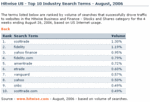 This week, I’ve been testing the New York Times Reader, released into beta last week. The beta, available for download, is open to all registered NY Times users (or you can register when you download). Users must be running Windows XP to install the Times Reader.
This week, I’ve been testing the New York Times Reader, released into beta last week. The beta, available for download, is open to all registered NY Times users (or you can register when you download). Users must be running Windows XP to install the Times Reader.
 The Times Reader provides you with online and offline access to the complete edition of the New York Times in a format designed to emulate the print edition.
The Times Reader provides you with online and offline access to the complete edition of the New York Times in a format designed to emulate the print edition.
Navigation is simple, with a menu bar for the various sections of the paper. The Microsoft-designed interface is clean, with easy to use features like the ability to change font size, save, print or email an article with a single click. A notes feature allows you to highlight, annotate or copy sections of the text easily.
 One compelling feature is that the New York Times Reader downloads the content locally to your PC so that it’s available offline as well. While web snobs may argue that offline access is quaint, there are many times when you may not be connected, but have time to read. It takes a few minutes for your first download (and you need to download .net 3.0 framework, but daily downloads are fairly quick and can be scheduled.
One compelling feature is that the New York Times Reader downloads the content locally to your PC so that it’s available offline as well. While web snobs may argue that offline access is quaint, there are many times when you may not be connected, but have time to read. It takes a few minutes for your first download (and you need to download .net 3.0 framework, but daily downloads are fairly quick and can be scheduled.
In particular, the offline capabilities are a boon to commuters. This morning, on my commuter train, as I browsed the Times on my laptop, the person next to me fired up their laptop (an HP with a stunning wide screen) and began to read today’s Times as well. I’ve always maintained my subscription to the print version of the Times, mainly for commuting purposes. I browse the WSJ online, but like to have something to read on the train. With the new Times Reader, I’ll have full access to the Times during the commute. It will be interesting to see how many commuters drop their print subscription with this switch.
A feature that I’d like to see would be integration with wireless devices. Perhaps the killer app for Blackberry users would be to allow users to select individual articles from the Times Reader (via their PC), then have them automatically emailed in PDF form to a wireless device. Or better, yet, I could subscribe to various columns and topics, to be emailed as a PDF attachment. Then, I could read the articles I’m most interested in wherever I am, without having to boot up the laptop.
The Times Reader provides a comprehensive online and offline experience, by far the most compelling e-newspaper to-date. The annotation and sharing functions support the behavior of users of the print version, who often tear out articles for later reference. With new advances and standardization in ebook technology combined with solutions like the Times Reader, we’re finally at a point where digital reading can become mainstream.
For now, the New York Times Reader is free and will be through the remainder of the beta period. Times Select features, such as content from editorial columnists are available for Times Select subscribers. According to PaidContent, the decision has yet to be made whether it will continue to be free when it officially launches in 2007. There’s little question in my mind that the New York Times Reader will cannibalize print sales. But for an advertising-driven vehicle, the benefits of increased readership may outweigh any such losses. It could also drive Times Select subscriptions, as those who give up the print version may still want access to the editorial content they’ve been accustomed to.
 Google VP of Content Partnerships David Eun posted a position statement to the Google Blog this week, restating and summarizing Google's positions vis-a-vis copyrights and its relationship with content providers.
Google VP of Content Partnerships David Eun posted a position statement to the Google Blog this week, restating and summarizing Google's positions vis-a-vis copyrights and its relationship with content providers.











